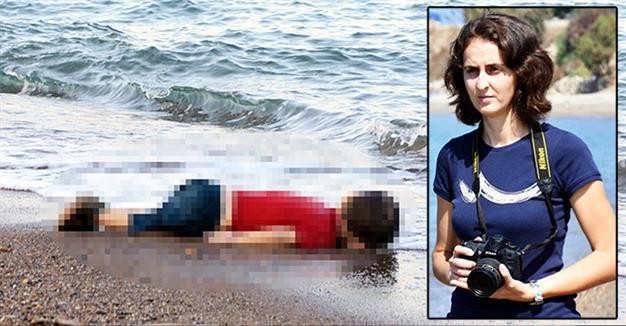Photographer of the world-shaking picture of drowned Syrian toddler: 'I was petrified at that moment'
BODRUM – Doğan News Agency

Photo-reporter Nilüfer Demir explained the moment she shot the heart-wrecking picture showing a Syrian toddler’s lifeless body washing ashore Turkey’s Aegean coast, an image bringing the “European migrant crisis” to the top of the world’s agenda urgently for the first time.
“At that moment, when I saw the three-year-old Aylan Kurdi, I was petrified,” said Demir, a photo-reporter covering the migrant crisis in Aegean resort town of Bodrum for Turkey’s Doğan News Agency (DHA), adding that she had no other option then to do her duty as a journalist.
Demir has clicked the shutter of her camera on Sept. 2 around 6:00 a.m., on Bodrum’s Akyarlar coast of Turkey’s Muğla province, where bodies of migrants washed ashore after two inflatable boats sank.
“Three-year-old Aylan Kurdi was lying lifeless face down in the surf, in his red t-shirt and dark blue shorts folded to his waist. The only thing I could do was to make his outcry heard.” It was that moment, Demir added, that she took the shot.
Demir then explained how she noticed another toddler, Aylan Kurdi’s brother Galip on the ground, without a lifejacket, just like the others migrants.
“Galip was lying 100 meters away from his brother. I approached him this time. I noticed they didn’t have any lifejackets on them, any arm floats, anything to help them to float in the water. This image was shows how dramatic the incident was” added the reporter.
Demir also told, as Doğan News Agency reporters, she and her colleagues in the region had been documenting the illegal crossing problem for the last 15 years, adding that the crossings have increased regularly in the last 2-3 months, particularly in the Turgutreis and Akyarlar neighbourhoods.
“On Sept. 2, I was on duty and also photographed … of a group of Pakistani migrants in an attempt to cross into Greece. While witnessing the tragedy, suddenly we noticed the lying, lifeless bodies. We recognized the bodies belonged to toddlers. We were shocked; we felt sorrow for them. The best thing to do was to make this tragedy heard,” said Demir.
Upon the question regarding her reactions as a woman to snapping the picture, Demir said, “Pain and sorrow…I have photographed and witnessed many migrant incidents since 2003 in this region… Their deaths, their drama. I hope from today, this will change. Hundreds, even thousands of migrants have flocked to Bodrum, because the Island of Kos is only 4 miles [away]. Migrants attempt to cross into Greece and then other European countries by boats, usually inflatable.”
Another incident was recorded by DHA cameraman Osman Uras, when more women and children faced the risk of drowning. Bodrum chief reporter Yaşar Anter disclosed another tragedy he witnessed on his camera and released June 4.
“Eight boats took off from here, this beach. Six of them appeared to be ruptured. After one mile, we saw the boats started to sink, and 50 people were rescued by the Coast Guard teams. They even tried to vanish in wooden boats. However, they capsized even before they reach half way,” said Anter.
The reporters urged that this issue was beyond the borders of Turkey and has become an international problem, as Bodrum district of Muğla has turned into a transition point for refugees attempting to flee to Europe.
 Photo-reporter Nilüfer Demir explained the moment she shot the heart-wrecking picture showing a Syrian toddler’s lifeless body washing ashore Turkey’s Aegean coast, an image bringing the “European migrant crisis” to the top of the world’s agenda urgently for the first time.
Photo-reporter Nilüfer Demir explained the moment she shot the heart-wrecking picture showing a Syrian toddler’s lifeless body washing ashore Turkey’s Aegean coast, an image bringing the “European migrant crisis” to the top of the world’s agenda urgently for the first time.